Glass jars are your best choice for root cellar storage because they create an impenetrable barrier against moisture, oxygen, and pests. You'll appreciate their durability and how easy they are to clean and sterilize, with no risk of chemical leaching or odor retention. Their non-reactive properties maintain consistent temperatures and preserve food quality, while the transparent design lets you monitor contents without breaking seals. When paired with oxygen absorbers, they'll extend shelf life greatly and prevent unwanted temperature fluctuations. Their versatility and reusability make them cost-effective over time, offering benefits you'll discover as you explore proper storage techniques.
Understanding Root Cellar Storage
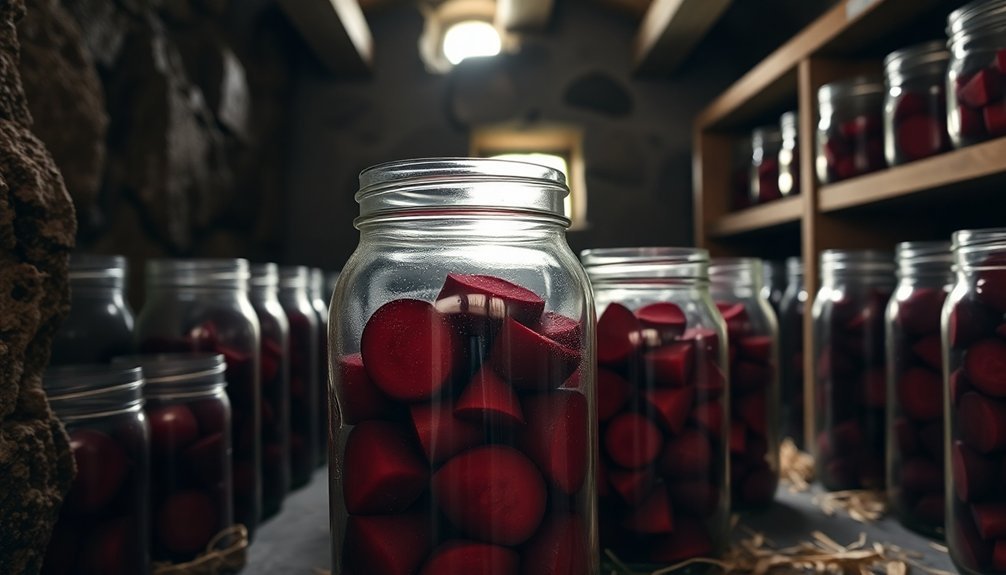
Four key advantages make root cellar storage an excellent choice for preserving your harvest.
You'll save energy compared to refrigeration while storing larger quantities of produce, maintain better flavor and texture in your foods, and create an ideal environment for winter squash and root vegetables. Traditional food storage methods like root cellaring have been used successfully for centuries.
Root cellars also offer versatile storage options for canned goods, condiments, and dried foods.
To maximize your root cellar's effectiveness, you'll need to maintain specific conditions.
Keep the temperature between 32°F and 40°F, and maintain humidity levels of 85% to 95%.
You'll want a dark environment to protect your produce from light damage, along with proper ventilation to prevent ethylene gas buildup.
Good insulation is vital for maintaining these conditions consistently.
You can store a wide variety of produce in your root cellar.
Root vegetables like carrots, beets, and potatoes thrive in this environment, as do cole crops and leeks.
Fruits such as apples and pears store well, along with winter squash, pumpkins, onions, and garlic.
Regular monitoring and maintenance, including checking for spoilage and rotating stock, will help guarantee your stored produce remains fresh throughout the season.
Glass Versus Other Materials
When choosing storage containers for your root cellar, glass jars offer distinct advantages over plastic, metal, and other materials. You'll find that glass provides an unmatched oxygen and moisture barrier, keeping your stored foods fresh and dry. Unlike plastic or metal containers, glass won't leach chemicals into your food, making it a safe, chemical-free option for long-term storage.
Glass jars are incredibly durable and reusable when handled properly. While they're heavier than plastic alternatives, their ability to withstand repeated use and resist corrosion makes them a cost-effective choice over time. You'll appreciate how easy they're to clean and sterilize, as glass doesn't retain odors or stains like other materials do. For optimal preservation, consider using oxygen absorbers to extend the shelf life of your dry goods.
- Picture crystal-clear jars filled with colorful preserved vegetables, lined up neatly on sturdy wooden shelves.
- Imagine steam rising as you sterilize sparkling clean jars in boiling water.
- Envision yourself easily identifying contents through transparent walls, unlike opaque containers.
- See yourself confidently storing dried herbs and grains, knowing they're protected from moisture and pests.
However, you'll need to handle glass jars carefully, as their fragility is their main drawback. Consider reinforcing your storage shelves to support their weight.
Temperature Control Benefits
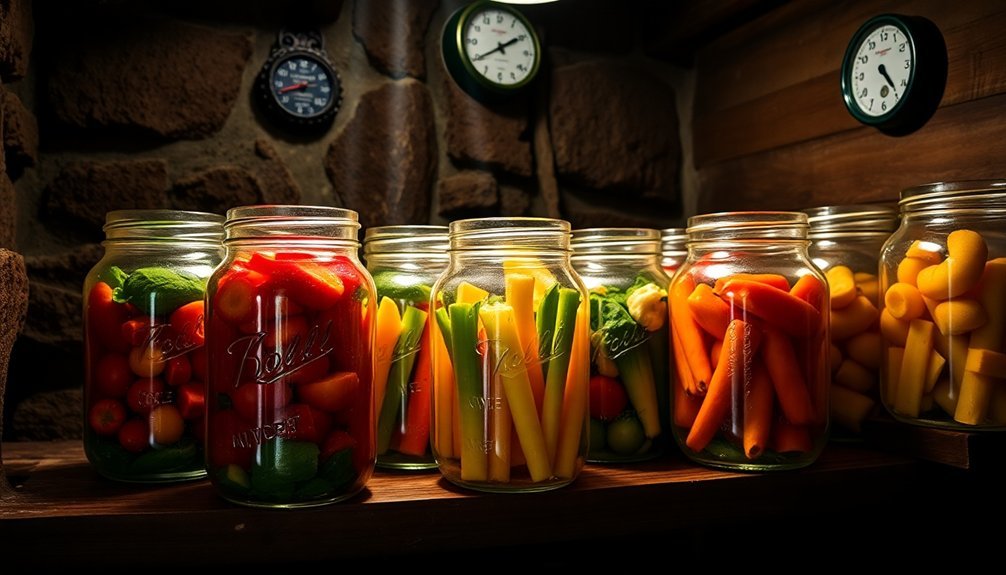
Glass jars will keep your root cellar produce at stable temperatures due to their minimal expansion and contraction properties.
You'll find that glass effectively maintains cold storage conditions between 32-40°F (0-4°C), protecting your vegetables from temperature fluctuations that could lead to spoilage.
Your stored produce stays fresher longer because glass jars resist heat transfer while their airtight seals prevent unwanted temperature changes.
The containers work especially well in a proper root cellar environment where high humidity levels help preserve food quality.
Stable Cold Retention
Root cellar storage's most vital feature lies in maintaining stable cold temperatures, and glass jars excel at this task. When you're storing produce at the ideal temperature range of 32-40°F (0-4.5°C), glass jars provide the thermal stability needed to keep your harvest fresh.
You'll find that glass's non-reactive properties prevent rapid temperature fluctuations, which is essential for preserving your vegetables' quality and preventing premature sprouting.
The stable environment you'll achieve with glass jars works in harmony with your root cellar's natural humidity levels of 85-95%. Since glass doesn't absorb moisture or react with its surroundings, you won't have to worry about mold growth or chemical interactions affecting your stored produce.
- Picture rows of glass jars filled with potatoes, their surfaces free from condensation
- Visualize the cool, stable air surrounding each jar, maintaining a constant 35°F
- See the perfectly stacked jars maximizing your storage space
- Imagine checking your produce months later, finding it as fresh as when you stored it
You'll appreciate how glass jars maintain consistent temperatures while providing an airtight seal that guarantees your harvest stays fresh throughout the storage period.
Heat Change Protection
Taking control of temperature changes becomes effortless with glass jars in your root cellar storage system. You'll benefit from the unique interaction between metal lids and glass containers, as they work together to maintain ideal storage conditions. The metal lids expand and contract rapidly with temperature changes, while the glass remains stable, creating a reliable airtight seal that protects your stored items.
When you store food in glass jars, you're getting superior protection against temperature fluctuations. The glass jars' slow expansion rate guarantees they maintain their shape and integrity, while the metal lids adjust quickly to temperature changes, enhancing the seal. This dynamic relationship prevents air and moisture from entering the jar, which helps preserve the quality of your stored foods.
You can confidently store your glass jars in various temperature conditions without worrying about rust or degradation. Unlike metal containers, your glass jars won't deteriorate in humid environments.
The transparent nature of glass also lets you monitor your stored items without breaking the seal, while the sturdy construction allows for convenient stacking and long-term storage in your root cellar.
Moisture Management With Glass
You'll find that glass jars offer excellent moisture management in root cellars through their airtight seals, which create a reliable barrier against unwanted humidity.
The non-porous nature of glass effectively blocks outside dampness from affecting your stored items, unlike metal or plastic containers that can absorb moisture.
To maintain condensation-free storage, you can use moisture-absorbing materials like charcoal or rice near your jars while ensuring proper ventilation between them.
Airtight Seals Prevent Humidity
A reliable seal makes all the difference when storing goods in a root cellar, and glass jars excel at providing exceptional moisture control. When you're storing items in your root cellar, you'll find that glass jars create an impenetrable barrier against external humidity while maintaining the internal environment of your stored goods.
Unlike plastic containers, glass's non-porous nature guarantees that no air seeps in, protecting your items from moisture-related spoilage and ethylene gas exposure.
You'll notice these clear benefits when using glass jars in your root cellar:
- Dried herbs stay crisp and aromatic, maintaining their essential oils without clumping.
- Root vegetables remain firm and fresh, protected from excess moisture that could cause rot.
- Grains and legumes stay completely dry, preventing any unwanted germination or mold growth.
- Spices retain their full flavor profile, as the airtight seal prevents volatile compounds from escaping.
Glass jars work particularly well in root cellar conditions because they won't degrade in high humidity environments while maintaining their tight seal.
This combination of moisture control and stability makes them ideal for preserving your stored items' quality and extending their shelf life.
Glass Blocks Outside Dampness
The remarkable moisture-blocking properties of glass jars make them indispensable for root cellar storage. Unlike other materials that absorb moisture, glass's non-porous nature prevents dampness from seeping into your stored goods. You'll find that glass jars maintain their integrity even in the most humid conditions, protecting your precious preserves and dry goods from moisture damage.
| Glass Benefits | Protection Methods |
|---|---|
| Non-porous surface | Elevated storage racks |
| No moisture absorption | Rubber-coated shelving |
| Chemical-free storage | Desiccant placement |
| Easy sterilization | Regular cleaning |
| Humidity resistance | Proper sealing |
You'll appreciate how glass jars don't rust, warp, or degrade like metal or plastic containers when exposed to damp conditions. They're incredibly durable and won't leach chemicals into your stored items, even with temperature fluctuations. You can easily maintain these jars by washing them in soapy water and sterilizing them in boiling water, which prevents mold growth common in humid environments. For maximum protection, store your glass jars on elevated racks and consider using desiccants nearby to absorb excess moisture.
Condensation-Free Storage Methods
Effective moisture management in glass jars requires specific storage techniques to prevent condensation buildup. You'll find that glass jars excel at maintaining proper moisture levels when you implement the right storage methods. Their non-permeable nature creates a perfect barrier against external moisture, but you'll need to verify the contents are properly dried before storage to prevent internal condensation.
- Store your glass jars at least 2 inches apart on sturdy shelves, allowing air to circulate freely and prevent moisture from collecting between containers.
- Place silica gel packets or oxygen absorbers at the top of each jar before sealing to trap any residual moisture.
- Position your jars away from direct contact with cool walls or floors, using wooden shelving to create a natural buffer zone.
- Check jar lids monthly for proper sealing, replacing any that show signs of rust or deterioration.
You can maximize the jars' moisture-management benefits by keeping them in areas with consistent temperatures.
Since glass is easy to clean and sterilize, you'll maintain ideal storage conditions by regularly wiping down the exterior surfaces and inspecting for any signs of internal condensation.
If you notice any moisture buildup, simply clean, thoroughly dry, and reseal the jars.
Food Preservation Quality

Inside your root cellar, glass jars excel at preserving food quality through multiple essential features. You'll find that their airtight seal creates a reliable barrier against moisture and oxygen, preventing spoilage and maintaining the freshness of your stored foods. This protection is particularly crucial for items like grains and spices that can quickly deteriorate in humid conditions.
You won't have to worry about your food's flavor being compromised, as glass doesn't impart any unwanted tastes or odors. Unlike metal containers, glass jars maintain your food's original taste, aroma, and texture due to their inert properties. They're also remarkably durable and can withstand temperature fluctuations without losing their integrity.
The transparency of glass jars gives you a significant advantage in monitoring your stored items. You can easily inspect the contents without opening the container, helping you spot any signs of spoilage early on.
This visibility also helps you organize your root cellar storage more effectively, ensuring you use older items before they expire. When sterilization is needed, you can safely boil the jars without concerns about degradation or harmful chemical release.
Pest Prevention Capabilities
Glass jars stand as formidable barriers against unwanted pests in your root cellar storage system. Their non-porous nature and airtight seals create an impenetrable fortress that prevents insects and rodents from accessing your stored food.
You'll find that glass jars don't emit lingering odors that might attract pests, and they eliminate the need for additional pest control measures inside the container.
To maximize your pest prevention efforts, you'll want to guarantee proper storage conditions and implement these key strategies:
- Place oxygen absorbers inside your jars to create an inhospitable environment for pests.
- Position your jars on elevated shelves or pallets to minimize ground-level pest access.
- Add bay leaves or peppermint oil near your storage area as natural deterrents.
- Clean and sanitize jar lids regularly to maintain airtight seals.
You can enhance your root cellar's pest resistance by maintaining proper ventilation and controlling humidity levels.
Remember to inspect your stored goods periodically for any signs of pest activity and guarantee all potential entry points in your root cellar are properly sealed.
With these measures in place, your glass jar storage system will effectively protect your preserved foods from unwanted visitors.
Space Optimization Strategies
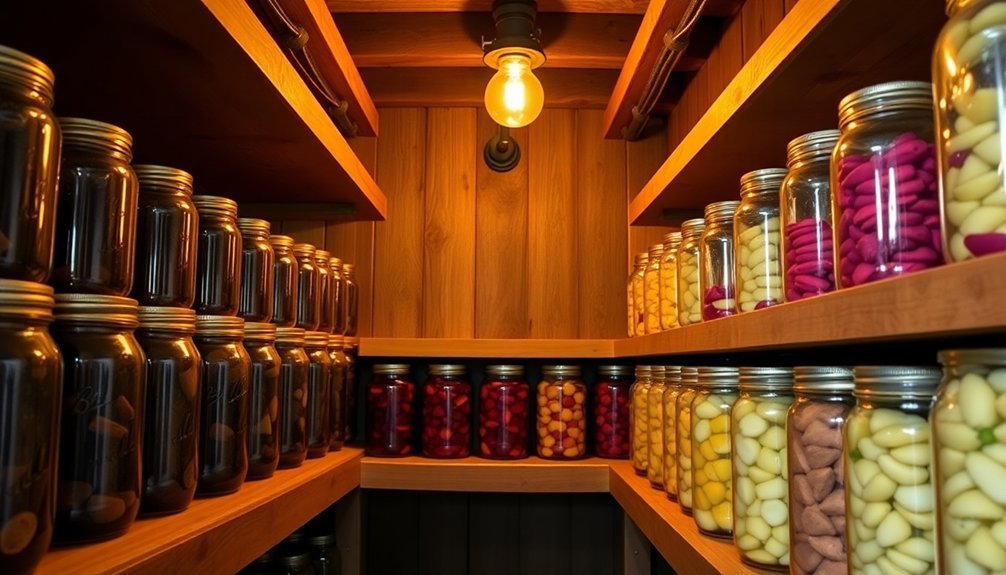
You'll maximize your root cellar's storage capacity by stacking glass jars vertically on adjustable shelving units that can be modified as your preservation needs change throughout the seasons.
Installing modular shelving systems lets you create custom arrangements that work efficiently with different jar sizes while maintaining proper air circulation with the recommended 1-2 inch gap at the back.
Your space efficiency improves further when you group similarly sized jars together in designated zones, making it easier to track inventory and maintain your FIFO rotation system.
Vertical Stacking Methods
Three key principles guide effective vertical stacking in root cellar storage. When you're working with glass jars, you'll want to maximize vertical space while maintaining stability and guaranteeing easy access to your preserved goods.
Glass jars excel in this area because they're designed with flat bottoms and uniform shapes that create secure stacking formations.
To create a stable vertical stacking system in your root cellar, follow these proven methods:
- Place larger, heavier jars on the bottom rows, creating a solid foundation that won't shift under weight.
- Stack identical jar sizes together in columns, guaranteeing even weight distribution and preventing dangerous tipping.
- Leave small gaps between jar columns to allow for easy removal without disturbing adjacent stacks.
- Keep stack heights reasonable – no more than 3-4 jars high – to prevent potential accidents and maintain stability.
You'll find that proper vertical stacking not only maximizes your storage capacity but also helps protect your preserved foods.
The durability of glass jars means you won't have to worry about bottom jars crushing under the weight of those above them, and their moisture resistance guarantees they'll maintain their structural integrity even in your root cellar's humid environment.
Adjustable Shelf Solutions
Adjustable shelving systems provide the cornerstone of effective root cellar storage, letting you adapt to changing preservation needs throughout the year. You'll want to construct shelves using white oak for maximum durability, incorporating notched frames and spacers to create adjustable heights that accommodate different jar sizes.
| Feature | Benefit | Implementation |
|---|---|---|
| 1-2" Wall Gap | Air circulation | Install spacer blocks |
| 8" Shelf Height | Jar accessibility | Use uniform spacers |
| 16" Shelf Depth | Easy reach | Build standard width |
| Slotted Design | Moisture control | Install spaced slats |
| Ladder Support | Weight bearing | Add rung reinforcement |
When designing your adjustable shelving, you'll need to guarantee each shelf can support over 2,000 pounds of glass jars. Don't forget to leave adequate space between shelves and walls for proper air circulation. You can fine-tune your storage conditions by creating separate sections with different shelf configurations. Build your support frames outside the cellar, then assemble them inside using a notched design for extra stability. Remember to elevate bottom shelves a few inches off the floor to maintain proper air flow and prevent moisture accumulation under your jars.
Modular Container Arrangements
Strategic modular arrangements maximize your root cellar's storage potential while maintaining essential airflow patterns.
When you're planning your glass jar storage system, you'll need to take into account both vertical and horizontal spacing to guarantee proper ventilation. By leaving a 2-inch gap between the wall and your shelving units, you'll create vital air channels that prevent moisture buildup and maintain consistent temperatures throughout your storage space.
Design your modular system with these proven arrangements:
- Stack uniform-sized glass jars in offset rows, creating a honeycomb pattern that distributes weight evenly across your reinforced shelving.
- Position taller containers on lower shelves where the floor-to-ceiling height provides better structural support.
- Arrange jars with frequently accessed items toward the front, leaving deeper shelf space for long-term storage.
- Group similar items in designated zones, using the natural temperature gradients of your cellar (cooler at bottom, warmer at top).
Remember to secure your shelving units with proper bracing and make sure they're elevated above the gravel floor.
You'll want adjustable shelf heights to accommodate different jar sizes while maintaining those essential air gaps for circulation.
Jar Selection and Sizing
A pristine glass jar in your root cellar does more than just look good – it's your best ally for long-term food storage. When you choose glass, you'll benefit from its non-permeable nature, creating a perfect barrier against oxygen and moisture while preventing any toxic leaching into your stored foods.
You'll also be making an environmentally conscious choice, as glass production generates considerably less greenhouse gas emissions than plastic alternatives.
You'll want to match your jar sizes to your storage needs. Select smaller jars for frequently accessed items like spices and herbs, where you'll appreciate easy handling and minimal exposure to air each time you open them.
For your bulk items such as grains, beans, and rice, opt for larger containers that'll maximize your storage efficiency. You'll find that glass jars can withstand both freezing and hot conditions without compromising their integrity, making them ideal for your root cellar's varying temperatures throughout the year.
The versatility in available sizes means you can create an organized system that's both practical and space-efficient, ensuring your stored foods remain fresh and protected for extended periods.
Safety and Handling Tips
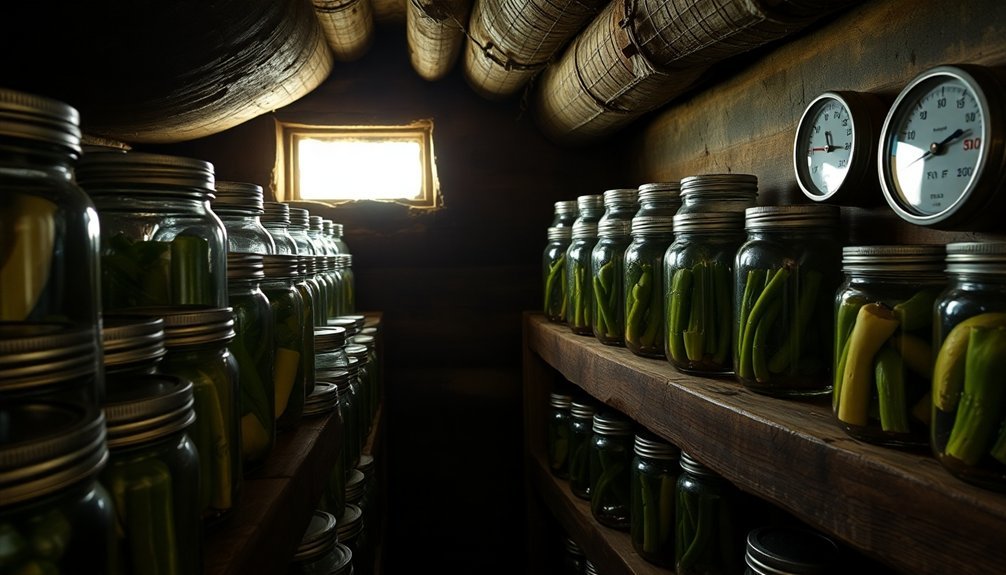
Successfully maintaining your glass jar storage system requires careful attention to safety protocols and proper handling techniques. You'll need to focus on both environmental controls and physical handling to protect your stored goods and prevent accidents.
Start by verifying your storage area maintains temperatures between 50°F and 70°F, while keeping humidity levels low to moderate. It's crucial to provide proper ventilation and darkness to maximize preservation.
When handling glass jars, remember these critical safety measures:
- Place cardboard dividers or old socks between jars to create protective barriers and prevent glass-to-glass contact.
- Sterilize jars in boiling water or a 250°F oven for 15-20 minutes before each use.
- Hand-tighten lids after carefully cleaning the rims to verify a proper seal.
- Inspect and patch any gaps or cracks with steel wool to prevent pest intrusion.
Don't forget to regularly check your storage area for signs of moisture, pests, or temperature fluctuations.
If you're using a root cellar, consider installing insulation to stabilize temperatures and protect your jars from sudden changes that could lead to breakage.
Always handle jars gently and use both hands when moving them.
Long Term Storage Success
Making the most of glass jar storage requires understanding its core benefits for long-term preservation. Glass's non-permeable nature creates an impenetrable barrier against moisture and oxygen, ensuring your stored foods maintain their freshness and nutritional value over extended periods.
You'll find that the airtight seal prevents contamination while preserving the original quality of your stored items.
While glass jars might seem delicate, they're remarkably durable and can be reused countless times without losing their effectiveness. You can store them in various temperatures, and they won't warp or deteriorate like plastic alternatives.
The jars' durability makes them a cost-effective choice for your root cellar storage needs.
You'll appreciate how glass jars protect your food's flavor and texture by creating ideal storage conditions. They prevent air and moisture from affecting your preserved items, while the cool, humid environment of your root cellar works in tandem with the jars to slow down natural decay.
Your stored foods will retain their taste, aroma, and nutritional content, especially when you keep the jars away from direct sunlight and extreme temperatures.
Cost Effectiveness Analysis
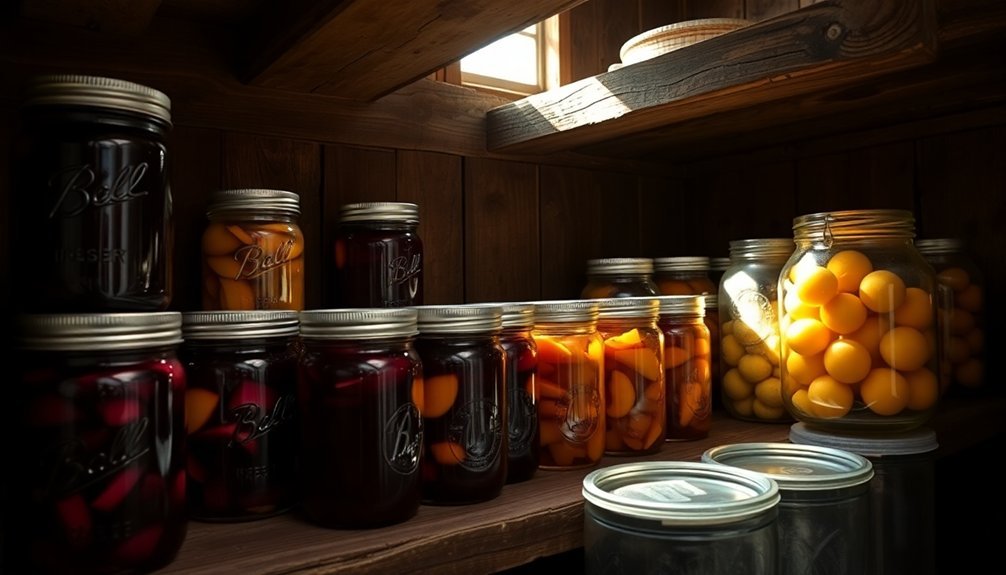
Investing in glass jars for root cellar storage consistently proves to be a smart financial decision. While the initial purchase might seem higher compared to disposable alternatives, you'll quickly recover these costs through years of continuous use.
Glass jars offer exceptional value through their durability, reusability, and minimal maintenance requirements.
You'll find glass jars particularly cost-effective because they:
- Don't require replacement every season like plastic containers that can warp or become stained
- Save you money on recurring purchases of disposable storage materials
- Maintain food freshness longer, reducing waste and the need to repurchase spoiled items
- Stack efficiently, maximizing your storage space and eliminating the need for extra shelving
The maintenance costs are minimal since you won't need special cleaning products or storage conditions.
Unlike metal containers that may rust or plastic that can degrade, your glass jars will maintain their quality through multiple uses.
You'll also save on energy costs associated with other preservation methods, as glass jars create an ideal storage environment that naturally extends food shelf life.
When you factor in their long-term durability and versatility, glass jars represent an economical choice for your root cellar storage needs.
Frequently Asked Questions
Can Glass Jars Withstand Pressure Changes During Seasonal Temperature Fluctuations?
Yes, you'll find that glass jars can handle pressure changes during seasonal temperature shifts. They're stable and won't degrade, though you should verify proper sealing to maintain consistent internal pressure throughout the year.
How Often Should Rubber Gaskets on Glass Jar Lids Be Replaced?
You'll need to replace rubber gaskets after about 30 uses or when you notice signs of wear. Don't risk failed seals – inspect them regularly and replace if they're stretched, damaged, or exposed to oils.
What's the Best Way to Prevent Glass Jars From Clinking Together?
You'll prevent jar clinking by placing cloth or paper between them, using jar racks for organization, and wrapping them in soft padding materials. Always store jars vertically and guarantee they're secured to prevent shifting.
Do Glass Jars Affect the Taste of Fermented Vegetables Over Time?
No, you won't notice any flavor changes from glass jars. They're non-porous and won't leach chemicals or absorb odors, so your fermented vegetables will maintain their original taste throughout the storage period.
Can UV Light Exposure Through Glass Jars Impact Stored Food Quality?
Yes, your food can degrade if UV light penetrates regular glass jars. You'll want to use UV-protective glass jars to prevent vitamin loss, oxidation, and flavor changes in your stored foods.
In Summary
You'll find glass jars are an excellent investment for your root cellar storage needs. They're durable, reusable, and protect your preserved foods from moisture and pests while maintaining ideal temperatures. By choosing the right sizes and handling them properly, you'll enjoy fresh, well-preserved produce year-round. When you consider their long lifespan and superior preservation qualities, glass jars are a cost-effective and reliable storage solution for your root cellar.
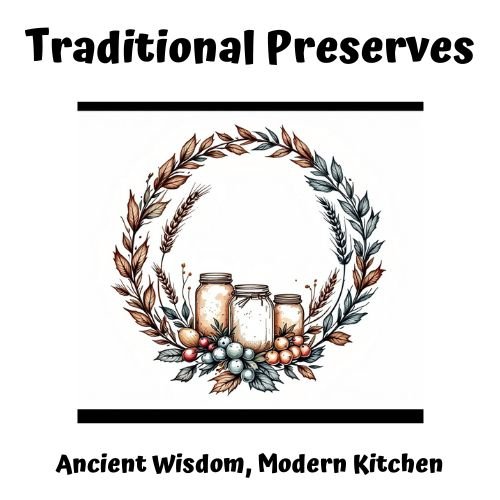
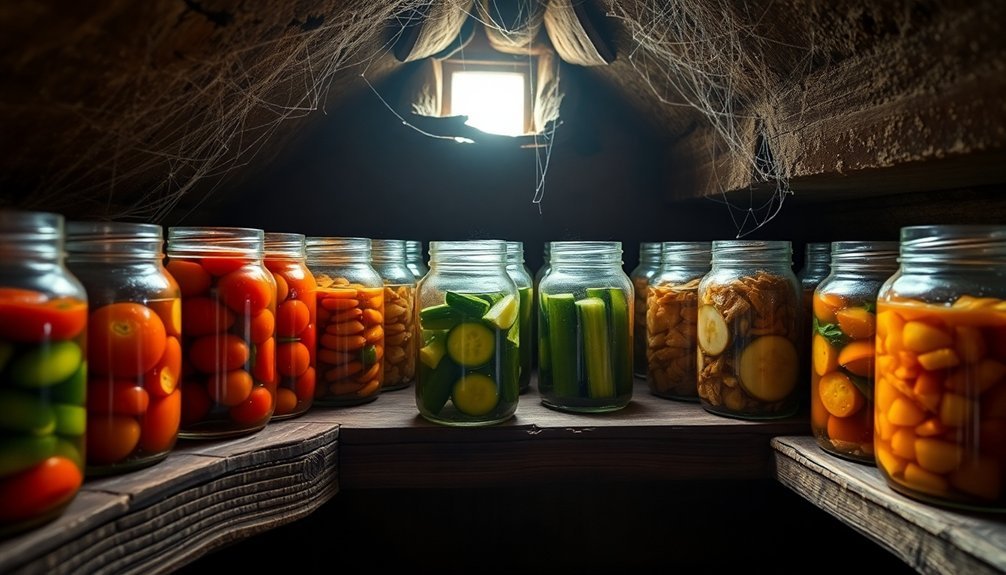
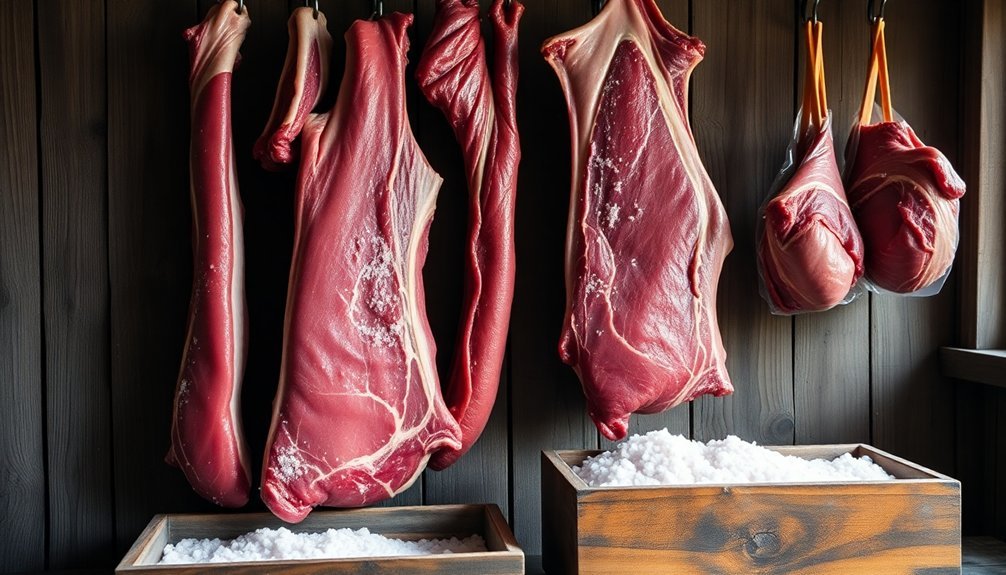
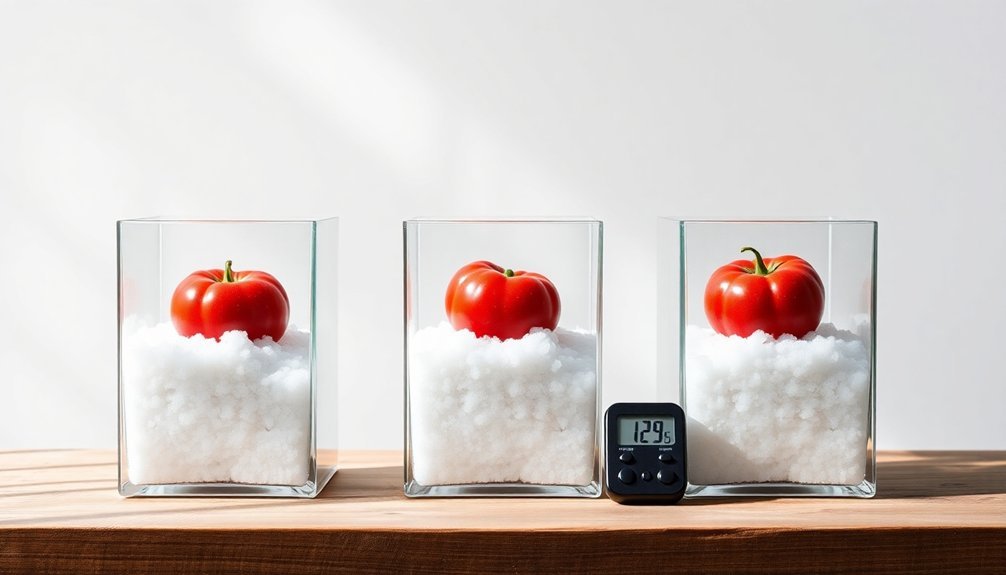
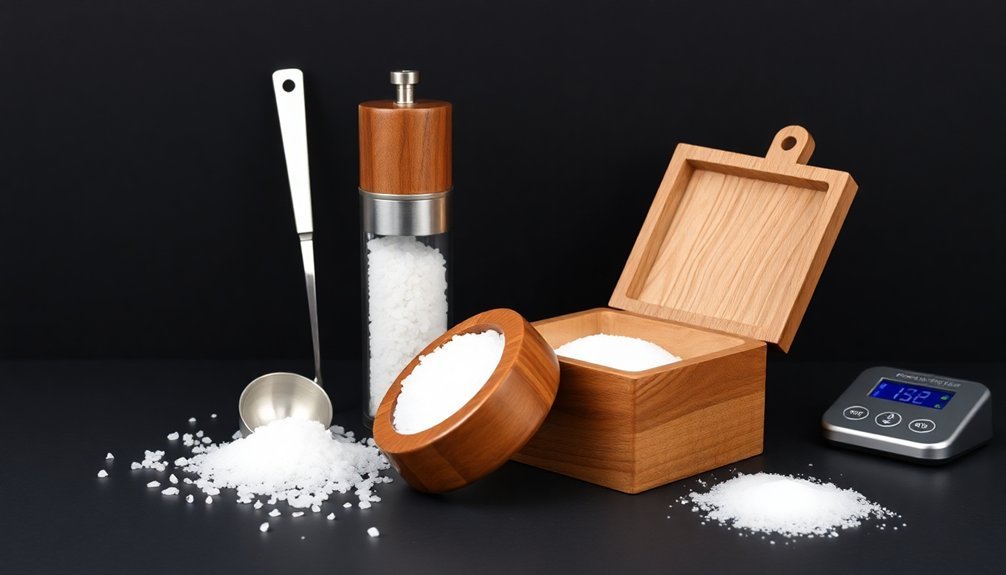
Leave a Reply